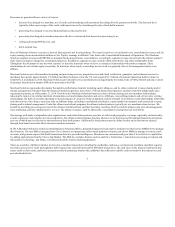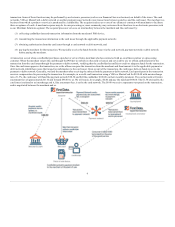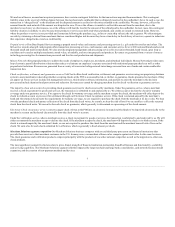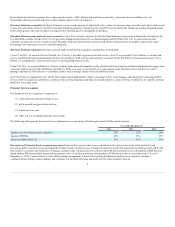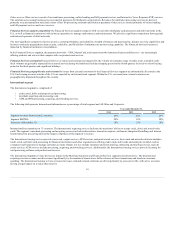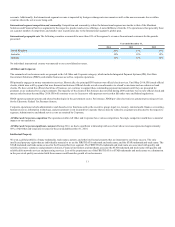First Data 2014 Annual Report Download - page 15
Download and view the complete annual report
Please find page 15 of the 2014 First Data annual report below. You can navigate through the pages in the report by either clicking on the pages listed below, or by using the keyword search tool below to find specific information within the annual report.
by the licensee, and require the licensee to demonstrate and maintain levels of net worth. Many states also require money transmitters, issuers of payment
instruments, and their agents to comply with federal and/or state anti-money laundering laws and regulations.
We are subject to unclaimed or abandoned property (escheat) laws in the U.S. and abroad that require us to turn over to certain
government authorities the property of others held by us that has been unclaimed for a specified period of time such as, in the Integrated Payment Systems
business, payment instruments that have not been presented for payment or, in the Merchant Solutions segment, account balances that cannot be returned to a
merchant following discontinuation of its relationship with us. A number of our subsidiaries hold property subject to escheat laws and we have an ongoing
program to comply with those laws. We are subject to audit by individual U.S. states with regard to our escheatment practices.
A number of our clients are financial institutions that are directly subject to various regulations and compliance
obligations issued by the Consumer Financial Protection Bureau, the Office of the Comptroller of the Currency and other agencies responsible for regulating
financial institutions. While these regulatory requirements and compliance obligations do not apply directly to us, many of these requirements materially
affect the services we provide to our clients and us overall. To remain competitive, we expend significant resources to assist our clients in meeting their
various compliance obligations, including the cost of updating our systems and services as necessary to allow our clients to comply with applicable laws and
regulations, and the cost of dedicating sufficient resources to assist our clients in meeting their new and enhanced oversight and audit requirements
established by the Consumer Financial Protection Bureau, the Office of the Comptroller of the Currency, and others. We expect to expend significant
resources on an ongoing basis in an effort to assist our clients in meeting their legal requirements.
Stored-value services we offer to issuers in the U.S. and internationally are subject to various federal, state, and foreign laws and regulations, which
may include laws and regulations related to consumer and data protection, licensing, escheat, anti-money laundering, banking, trade practices and
competition, and wage and employment. These laws and regulations are evolving, unclear, and sometimes inconsistent and subject to judicial and regulatory
challenge and interpretation, and therefore the extent to which these laws and rules have application to, and their impact on, us, financial institutions,
merchants or others is in flux. At this time we are unable to determine the impact that the clarification of these laws and their future interpretations, as well as
new laws, may have on us, financial institutions, merchants or others in a number of jurisdictions. These services may also be subject to the rules and
regulations of the various international, domestic and regional schemes, networks, and associations in which we and the card issuers participate.
In addition, the Housing Assistance Tax Act of 2008 included an amendment to the Internal Revenue Code that requires information returns to be made for
each calendar year by merchant acquiring entities and third-party settlement organizations with respect to payments made in settlement of payment card
transactions and third-party payment network transactions occurring in that calendar year. Reportable transactions are also subject to backup withholding
requirements. We could be liable for penalties if we are not in compliance with these regulations.
15


